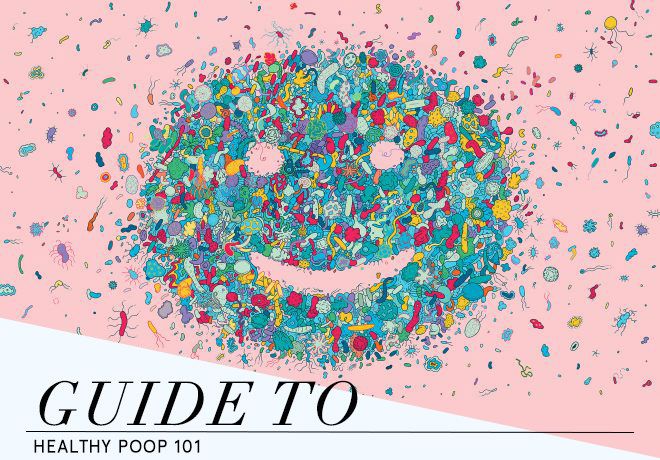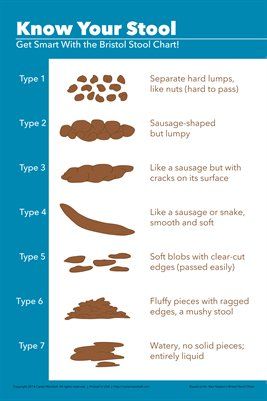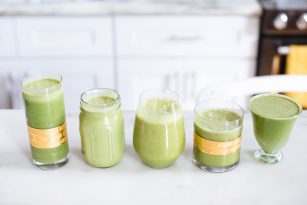There, I said it. The word poop, bowel movements, and ins and outs as a Registered Dietitian are daily lingo in conversation for me. But how have we never talked about poop on the NS Blog as it’s own post?! Today friends, I hope to give you answers to common questions I receive from readers and from clients alike all about digestion and what’s “normal”, healthy, and signs of happy digestion. Keep reading to take it to a whole new level.
happy belly = happy body
As more time goes on, research and health practitioners over the globe are honing in on the importance our gut health has on our overall health and wellbeing. Our digestive system is responsible for the obvious such as digesting food and absorbing nutrients, but it’s also been shown to play an important role in our immune function, mental/emotional wellbeing, improve some disease states, and can impact our hormones, skin, and hair. It’s all intertwined, which is a beautiful thing, yet takes a little more nursing to figure out any digestive issues. In physiology class as an undergraduate at Ohio State University (go Bucks!), I first was intrigued with the digestive system and all the inner workings of the magical organ that’s carefully and tightly coiled in our core. This intrigue for the digestive system carried with me into graduate school where I dove in learning all I could about digestive disruptions, disorders, challenges, and food intolerances – mainly out of a self-need to figure out my own digestion and what was wrong with it. You can read more about my story here in case you’re new to NS!
What is a “normal” bowel movement?
Normal is all relative, so what matters is how consistent your bowel movements are. For example, if you’re going 5-6 times a day, most likely you’re experiencing bowel movement Types 5-7 which are not normal. On the contrary, if you’re going 1-2 times a week most likely you have Type 1-2 constipated bowel movements which aren’t ideal either. I recommend clients to use the restroom at least once a day, if not twice, depending on the amount of food they consume, digestive capacity, metabolism, etc. Also ask yourself, do you feel great and “light” after your bathroom break? If so, that’s a good indicator you eliminated completely.
What is a “healthy” bowel movement?
Just as the word “normal” is relative to each individual, so is the word “healthy” when it comes to all areas of health including bowel movements. But across the board, a healthy bowel movement is one with ease – I call it the walk in, walk out. You know how there are commercials, TV shows, or books made for bathroom reading? My question is, what in the world are these people doing! If you have a healthy bowel movement, you should listen to the urge, walk in the bathroom, go, and sometimes leave just as quickly as if you were urinating. If you find yourself straining or sitting on the toilet for a long time, something isn’t normal or healthy with your digestive system and I highly recommend working with your physician or dietitian to get things sorted out asap.
What should I look for to know I have a healthy digestive system?
Literally, look. I know it’s not a sexy topic, but looking at stool can tell us so much about our health and what’s going on with our gut from stress, exercises/lack of, to our body’s ability to absorb and digest! That’s a lot of information in one look. We have Dr. Stephen Lewis and Dr. Ken Heaton at the University of Bristol in 1997 to thank for the Bristol Stool Scale, a way of classifying bowel movements based on a variety of characteristics including color, shape, and ease (pictured below).
Type 1: Likely very dehydrated and constipated, could indicate some bowel blockages as well.
Type 2: Constipated
Type 3: Mildly constipated
Type 4: The golden rule for a healthy bowel movement!
Type 5: Could indicate there wasn’t a full elimination from your last bowel movement.
Type 6: Could indicate malabsorption, especially dietary fat depending on if it sinks or floats (floats indicates fat malabsorption and commonly seen in those with gallbladder issues).
Type 7: Could indicate malabsorption, therefore you’ll need to be mindful of possible nutritional deficiencies.
What is gut healing? Do I need this?
Gut healing has been a term used to describe a specific protocol from a diet and lifestyle perspective to help improve digestive issues such as bloating, diarrhea, constipation, intolerances, and a myriad of health issues related to our gut. So, do you need this? Maybe. If you suffer from uncomfortable bowel movements and digestive stress, I recommend talking to your physician, gastroenterologist or get with an RD who can help you pinpoint the underlying issues with leaky gut.
What can I do today to help improve my bowel movements?
A lot! If you’re not already following the NS lifestyle and nourishing your body with plenty of whole foods each day that are loaded with fiber, minerals, and vitamins, then first take a look at what you’re eating.
Second, if that’s in place and you feel your diet is great, what about exercise? Movement helps our body move in many ways, including our digestion, so get moving!
Third, de-stress. Stress is a huge factor in digestive issues for those who suffer from IBS but all of us can experience an “off” feeling in our gut from stress. Practice these tips in the morning routine post!
Fourth, supplement! There are some supplements I recommend to clients to give them a head start such as Naturally Calm, which is a nice magnesium drink that helps soften stools while you sleep without any laxative effects (unless you take too much). Vitamin C daily can help naturally soften stools as well, and so can taking MCT oil daily like in your Matcha Tea Latte or Coffee Elevated.
Fifth, drink that water! Dehydration is a huge culprit of constipation and long bathroom breaks. Aim to drink at least a couple liters of water a day depending on your geographic location, how much you sweat, and what color your urine in (goal is clear to light yellow).
Sixth, lay off the coffee. We all know that coffee increases peristalsis in our gut (i.e. makes us go to the bathroom), but it can also be a cause of dehydration and can stress our bodies and adrenals out if you’re already under stress. Think of coffee as being a last resort to help a bowel movement, otherwise, consider making these changes today and watch your digestive system become happier by the day.
Lastly, use this squatty potty! Resting your feet on a small stool helps elevated your body and realigns your digestive system the way we were autonomically meant to use the restroom. Eastern culture does this for a reason. It helps your body fully eliminate.
Want to learn more? Check out these articles:
- Heal your gut by Chris Kresser (appreciate his perspective on gut health and the importance)
- Food to supercharge your gut bacteria (Physicians Committee for Responsible Medicine)
- Gut bacteria and our mood (New York Times)
- Can the bacteria in our gut make us fat or thin? (Scientific American)
- Guide to probiotics and why you need them
- 5 fruits to help improve digestion
What lingering questions do you have about healthy bowel movements and a happy belly? Share them below! I hope this post helps and if it does, please share.
xx McKel








